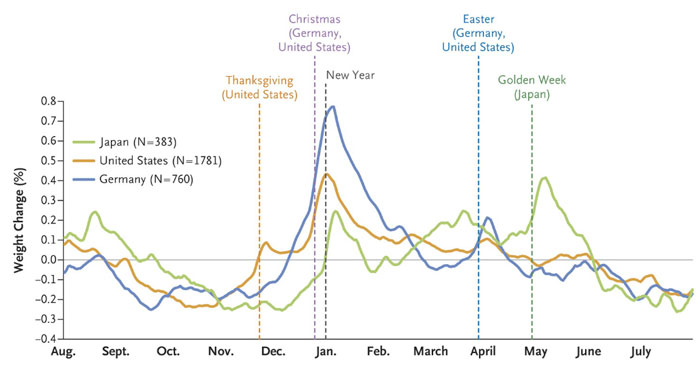If you're feeling pretty good about your waistline right now, don't let it go to your head (or your gut, as it were).
A new study shows that right now is when many of us will reach our lowest weight in 2016, as we head into the part of the year where we indulge in energy-laden holiday food and drinks – and stack on the extra kilograms accordingly.
And while some of us might exercise some restraint and not actually gain too much weight over the holiday period, research suggests that what we do stack on takes a whole lot longer to lose.
"We found that in the US, it isn't until after Easter, about a five-month period, that weight patterns even out," says researcher Brian Wansink from Cornell University.
"Chances are, right now, most Americans are at their lowest weight of the year."
 Wansink et al
Wansink et al
Wansink and his team recorded the daily weight changes for almost 3,000 people in the US, Germany, and Japan who were using a 'smart scale' produced by French electronics company, Withings.
These kinds of devices are connected to the internet via Wi-Fi, meaning users don't need to remember to log or self-report their weight – as soon as they've stepped on the scales, their weight is uploaded to the cloud, which makes it easy to keep track of your weight over time.
The researchers used that logic to track how holidays – and the extra food and drinks that come with them – influence our weight gain over the course of the calendar year, from the beginning of August 2012 to the end of July 2013.
For the 1,781 American participants whose weight was analysed during that period, weights rose on average by 0.2 percent during Thanksgiving, and another 0.4 percent at Christmas.
Those gains took almost half a year to reverse, with the participants' weights stabilising between May and November — around about which time the cycle kicks off again.
"Whether it be office parties, whether it be receptions, whether it be your friends' parties, or it could be you just buying a lot of stuff and eating while you're preparing things, there's this real ramp up to almost every holiday," Wansink told Niraj Chokshi at The New York Times.
"Anything that happens in these next 10 weeks, on average, takes about five months to come off."
The same trends were displayed in participants in Germany and Japan, with the exception that differing local holiday customs gave each country a slightly different weight graph (pictured above).
For the 760 German participants, weights rose on average by 0.2 percent during Easter, while Japanese participants (383 in total) bumped up by 0.3 percent during Golden Week.
In each country, the peak weight gain period (as a percentage of overall weight) was in the period between Christmas and New Year – which also represented the greatest overall weight for Americans and Germans in the study.
During this window, the Americans gained an average of 0.6 kilograms (1.3 pounds), Germans gained 0.8 kilograms (1.8 pounds), and the Japanese went up 0.5 kilograms (1.1 pounds).
Of course, it's worth pointing out that the participants in this research aren't exactly the average person – each one had personally bought a wireless scale worth around $150, which locates them in the small percentage of people who would actually spend that much on a weight-monitoring device.
But as far as the researchers are concerned, the fact that even these kinds of weight-conscious fitness gadget owners aren't immune to holiday weight gain goes to show just how strong the trend could be in the greater population.
"Even among this diligent, almost-ideal population, there's no escaping this almost inevitable holiday weight gain," Wansink told The New York Times.
But rather than dwell on the fact that weight gain is an inevitable, annual cycle that even fitness gurus can't break out of, the researchers say we should use the findings to help get ahead of the curve – literally.
"Instead of trying to come up with a New Year's resolution to lose weight," Wansink told The New York Times, "it's a whole lot better to maybe have an October 1 resolution to gain less in the first place."
The findings have been published in The New England Journal of Medicine.
